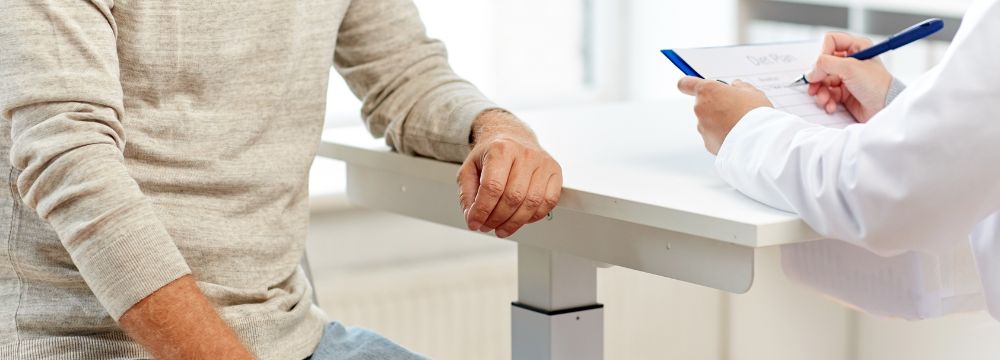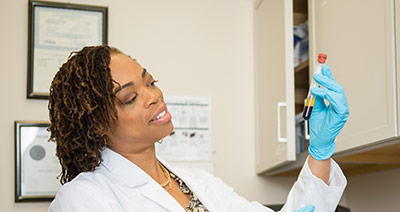Rezum: What to Expect

REZUM therapy is a minimally invasive, in-office, and non-surgical procedure to shrink an enlarged prostate due to benign prostatic hyperplasia or BPH. Heat generated by radiofrequency waves is delivered to the prostate through a needle that emits water droplets that generate steam. This allows for a rapid treatment that has the ability to expand but will not go beyond the anatomical boundary of the prostate itself.
The REZUM starts with a transrectal ultrasound which will be used to take a picture of the prostate, determine its dimensions, and inject lidocaine as local anesthesia. This is a very well-tolerated step akin to numbing before a dental procedure and is very quick. The patient will then be repositioned with legs in stirrups and the REZUM can commence.
The REZUM is performed through a cystoscope inserted into the urethra. Each treatment takes only nine seconds, and in the hands of Dr. Engel usually either five or seven treatments are performed in total. Thus, a TUNA takes approximately only a minute or two to perform. During the procedure, there may be slight pain at around the seventh second of each nine-second treatment that immediately dissipates once nine seconds is reached. One may experience the feeling of needing to urinate during the procedure. Once finished, a catheter is inserted, and a urinary drainage bag is attached to the patient’s leg, and this will be used to drain the patient’s urine for 2 days.
In Dr. Engel’s case, the patient takes their own catheter out two days later and follows up three days later in order to ensure that there is no urinary retention. Although there may be some irritation to urination at that point, generally there is little recovery to be done once the catheter is removed. Classically the REZUM is done on a Tuesday so the patient can be seen in the office on Friday before the weekend. It is quite normal for urination to be more difficult on this day and for symptoms to be worse than before. In select cases, Dr. Engel will recommend that a patient be taught self-catheterization as a means of helping the bladder until the symptoms die down and the bladder can do the work on its own. Not everyone will be told to do this, nor is this considered a permanent fixture at all. The goal is to never need an emergency room, and self-catheterization can be a great tool for some patients.
The REZUM procedure is performed in the downtown office of Urologic Surgeons of Washington only. Patients will have been given prescriptions for Valium, antibiotics, and also pain medicine for use both before and after the procedure.
Common experiences are blood in the urine, the feeling of needing to urinate while the catheter is present, tingling at the tip of the penis, or even bladder spasms, which represent a sudden urge to urinate with bleeding or leakage around the catheter. If the catheter gets clogged, or if there is any concern after the procedure, we ask that the patient come back to our office the same day so we may assist him. If the catheter gets clogged after hours, we advise the patient to simply take out the catheter at that time, as successful urination will probably ensue. If not, an emergency room visit will be required. Fevers after a REZUM should never be considered normal and may be a sign of a rare infection. If you are experiencing an emergency that cannot be accommodated by an office visit the same or the next business day in either of our locations, please dial 911 or go to your nearest or favorite emergency room and ensure that Dr. Engel or Dr. Tobon are contacted to take part in your care. As a reminder, USW physicians have privileges at Reston Hospital Center, Holy Cross Hospital Silver Spring, and Holy Cross Hospital Germantown.
Expectations After a REZUM
Over the course of the next several weeks, the treated tissue will slowly be absorbed into the body. As the body absorbs the extra tissue, the prostate begins to shrink and the patient will see incremental improvements in their symptoms. Patients will experience the full degree of improvement within 10 weeks of the procedure. We quote a 75-80% success rate with REZUM which may be an underestimation, and success, on average, lasts 5 years.
Frequently Asked Questions
When can I expect my BPH symptoms to go away?
Most patients will notice improvement within two to six weeks. However, results may vary depending on the severity and duration of symptoms and the size of the prostate treated. Full improvement may not occur for two to three months. Follow your post-procedure instructions as to when to stop taking your BPH medication.
What potential side effects are associated with REZUM?
Possible side effects include increased length of catheterization, bleeding around the catheter, blood in the urine, pain/discomfort, urgency to urinate, increased frequency, and urinary tract infection. Patients may also experience a minor burning sensation when urinating for one to two weeks following the treatment.
What is the risk of incontinence?
There were no reported cases of incontinence in the original clinical study for approval of this therapy. The surgeons at Urologic Surgeons of Washington generally quote a far less than 1% risk of incontinence afterREZUM.
Will there be any sexual side effects?
During the original clinical study conducted for the approval of this therapy, less than two percent of REZUM therapy patients experienced any degree of impotence, and less than one percent of patients experienced retrograde ejaculation. We have noticed, however, a 10-20% incidence of reduced semen volume after a TUNA/Prostiva, so we quote this as a more realistic expectation.





